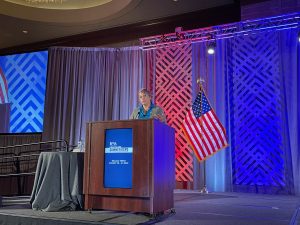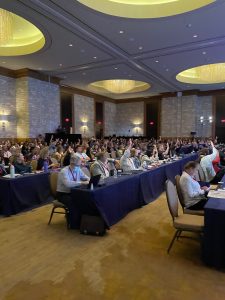SCI/D clinicians learn how to combat burnout at PVA Healthcare Summit + Expo
Employee burnout has highlighted the news lately, especially as workers begin returning to their offices after more than two years of novel coronavirus (COVID-19) pandemic restrictions. And health care employees, including those in the field of spinal-cord injury and disease, are some of the most impacted.
That’s why the Homer Townsend, Jr., Memorial Lecture opening keynote speech on Aug. 29 –the first day of the Paralyzed Veterans of America Healthcare Summit + Expo in Dallas –focused on what clinicians can do to find joy in their work.
Rita Hamilton, chief medical officer and medical director for Baylor Scott & White Institute for Rehabilitation and chief of physical medicine and rehabilitation at Baylor University Medical Center in Dallas, told the crowd of over 600 doctors, nurses, therapists, social workers and others that she wanted to give them something they could put into action as soon as they left the Trinity Ballroom at the Omni Dallas Hotel.

“I want you to leave here being able to recognize the signs and symptoms of burnout … in yourselves, in your colleagues and your family members,” Hamilton says. “What are some of the factors that lead to this… are there ways to create a culture of prevention and wellness for this and what can you do to protect yourself? And lastly, how do we move from all of this that we’re experiencing, this post-COVID or COVID recovery time?”
Hamilton began by defining self-awareness, which she says is necessary for people to understand their emotions, strengths, weaknesses, needs and drive.
“People who have solid self-awareness, they’re really not overtly critical and they’re not unrealistically hopeful,” Hamilton says. “But what these people with self-awareness are is they’re honest. They’re honest with themselves and they are honest with others.”
In addition, people need to develop resiliency, or the ability to bounce back and withstand hardships.
“In the face of something, can you overcome the disruption?” she says. “I think COVID has brought about ways to be resilient that we didn’t know existed. And I think you’ve probably witnessed folks who are truly resilient during this time. It’s based on a combination of things — internally, your genetic wiring, externally, the things that affect you, and then do you have skills, problem-solving abilities to be resilient?”
Lastly, she defined burnout as a decline in performance, emotional and physical exhaustion and lack of feeling personal accomplishment. It’s marked by depersonalization and a negative attitude toward work, patients and coworkers. She says it can be thought of as a personality mismatch between the person and the environment.
“Why does this resonate so poorly with all of us providers in the room?” Hamilton says. “I think this suggests failure if we demonstrate some of these qualities of burnout. No one in this room failed, or they wouldn’t be in this room. It also suggests that we are not resourceful. We are resourceful … Health care providers have a profound and unrecognized threat to our well-being just by where we work and the setup of our institutions.”
She says to continue to have vigilance and focus at such a fast pace is not sustainable, leading to health care worker burnout.
Admitting it was a bit of an exaggeration, she compared their work to when Captain Chesley “Sully” Sullenberger III safely landed US Airways flight 1549 on the Hudson River after hitting a flock of geese while taking off from LaGuardia Airport in New York in January 2009.
“Did they say to him, ‘Captain, dry off. You’ve got a flight this afternoon’? Don’t think so,” Hamilton says. “So, you as providers, every day you go in a room and you leave that room, and guess what? You have to go in the next room, whether it’s in the ER, whether it’s in the trauma bay, whether it’s in just a treating session. But you have to take care of this patient here, leave that one and go to the next one. You don’t have time to go dry off and realize what you just did or take a nap or whatever.”
Hamilton says finding happiness ultimately is all about balance.
“Balance between giving and getting, stress and calm, work and home,” she says. “When people are burned out, they have less productivity. That then affects patient care. There is a decline in professionalism. You change as a person. Therefore, the health care system declines as a whole.”
Her tips to combat burnout and reduce stress include setting healthy boundaries, delegating tasks at work and home, taking breaks, eliminating distractions, participating in energizing professional experiences and finding ways to gain control over the workload. Leaders should also prioritize a culture of wellness by implementing stress-reduction programs, training and/or job sharing.
“I want you to monotask. Just do one thing at a time. Stop trying to be the great multitasker,” Hamilton says. “Work in spurts … ignore the email. What happens when you check your email? Heart rate goes up, blood pressure goes up, cortisol levels go up … it’s factual, if you have a clean environment, you feel less cluttered, so pick it up and it’ll make you feel less stressed.”
Overall, she encouraged attendees to take action to manage their energy at home and at work, take advantage of valuable resources, look to change their systems, anticipate stress and become self-aware and resilient.
“Especially in this post-COVID recovery, we have pushed so many things down in our well-being and our psyche, and now it’s coming out in different ways, so watch out for you, watch out for your coworkers, watch out for your patients to see how they are recovering,” Hamilton says.
Myrtice Atrice, BS, PT, DPT, CLT, a physical therapist from Fayetteville, Ga., and PVA Education Committee member says Hamilton’s speech was timely.
“Since COVID, it just seems like we’ll never get back to what we consider normal, not just in our professional work but in our lives in general,” Atrice says. “We’ll never get back to that, so just pointing out and bringing to the forefront that the stresses not only at work, but in our lives, as she said, you could take something away from it [her speech] right away. You could just internalize things and know that, wow, we’ve got to be more protective of ourselves. All the things she said, you knew already, but you don’t practice it. You know you should set boundaries, but people ask and you’re trying to serve, you want to serve. Sometimes you jeopardize your own well-being to meet that commitment that you have in your profession or in your community, any of those things.”



